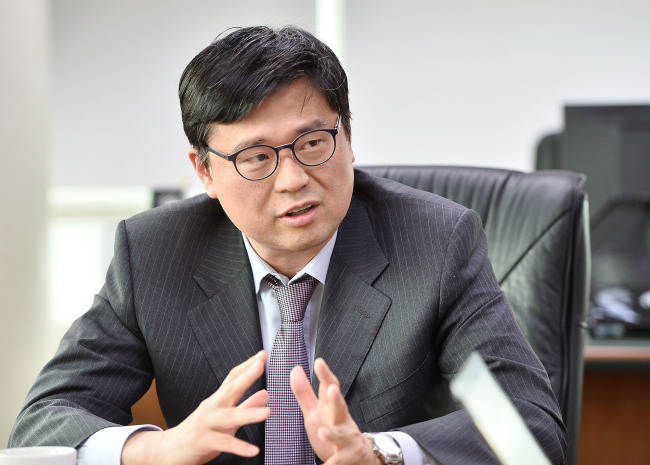[Doing Biz in Korea] ‘FDI should move from quantity to quality’
By Shin Ji-hyePublished : April 11, 2018 - 15:21
The Korea Herald is publishing a series of features and interviews on South Korea’s business environment for foreign companies and investors. This is the fourth installment. -- Ed.
Foreign direct investment has significantly contributed to the Korean economy over the decades. It has nearly doubled in the last 10 years to reach $22.8 billion last year, creating around 700,000 jobs and contributing to 20 percent of the nation’s total exports last year.
Now, Korea should be wiser in attracting such investment by moving from quantity to quality, according to the chief of Invest Korea, a state-run organization responsible for attracting foreign investment in partnership with ministries, regional governments and free economic zones.
Foreign direct investment has significantly contributed to the Korean economy over the decades. It has nearly doubled in the last 10 years to reach $22.8 billion last year, creating around 700,000 jobs and contributing to 20 percent of the nation’s total exports last year.
Now, Korea should be wiser in attracting such investment by moving from quantity to quality, according to the chief of Invest Korea, a state-run organization responsible for attracting foreign investment in partnership with ministries, regional governments and free economic zones.

“In the past, we focused on big investment and big numbers in attracting foreign investment. Now, we are looking into companies that are involved in the ‘fourth industrial revolution’ or that can create jobs,” said Kim Yong-kook, the head of Invest Korea, in an interview with The Korea Herald. He joined the organization in 2016 after a 28-year career at financial organizations, including Samsung Securities and Standard Chartered Bank.
Invest Korea, among other tasks, helps foreign investors with the process of selecting business sites, seeking local partners and setting up companies. It also offers advice on tax regulations and the general living environment.
By companies that are involved in the fourth industrial revolution, Kim was referring to firms developing next-generation technologies, including those related to bio, chips, secondary batteries, automobiles, robots, energy and drones.
A number of such companies have recently increased their investments in Korea by taking advantage of its market, infrastructure and manpower.
In the first quarter of this year, a European chip wafer company invested $400 million in building additional factories here to supply its parts to Korean chipmakers on growing demand for digital devices. A European car parts firm newly invested $540 million in solution and parts development for self-driving cars in partnership with local parts firm. A bio firm from the US increased its investment by around $10 million in producing medicine for leukemia and osteoporosis, and a tech firm increased its investment by around $100 million for its cloud computing business by utilizing Korea’s information technology infrastructure and manpower.
“We are also looking into companies in the areas of high-value service industries and green field investment that can create jobs,” he said.
This is in line with the government’s goal of creating 10,000 jobs this year through foreign direct investment as unemployment has become a serious social issue here.
On Wednesday, the government gave awards to three foreign firms that have significantly created jobs and made investments. They were Japanese firm Toray Battery Separator Film Korea, which hires more than 50 employees every year, Swedish firm Ikea Korea, which hires 1,720 employees, and Japanese auto parts firm Shanso Korea.
As for why foreign investors want to come to Korea, Kim picked its “market and consumers.”
“When I meet foreign investors, the first thing they mention about Korea being attractive is the market, which has big anchor companies and a decent-sized market,” he said.
Many global firms in the areas of tech and automobiles make their presence here to supply their products to or make business partnerships with Korean firms, including Samsung, LG, SK and Hyundai.
Korea’s domestic market is the world’s 14th largest -- much larger compared to its territory -- and its e-commerce market is the world’s seventh largest, according to Invest Korea.
“Besides the market, Korean consumers are very sophisticated so whenever they try a new product and it sells well in Korea, the companies can use it as a sign that they can sell the products elsewhere.”
Fashion and tech firms tap the Korean market before launching new products across Asia as they view local consumers as being fashion-conscious and tech-savvy.
French cosmetics company L’Oréal, for instance, established its research and development center in 1999 in Korea to sell products that are successful here in the global market. British luxury fashion brand Burberry opened Burberry Beauty Box to sell its fashion items in Korea as the first Asian nation.
Taiwanese game firm X-Legend set up its second global office in Korea following Japan to take advantage of the world’s second-largest game market, the fast internet speed and the high penetration of high-end smartphones.
By Shin Ji-hye (shinjh@heraldcorp.com)



















![[Today’s K-pop] Treasure to publish magazine for debut anniversary](http://res.heraldm.com/phpwas/restmb_idxmake.php?idx=642&simg=/content/image/2024/07/26/20240726050551_0.jpg&u=)